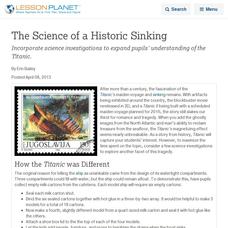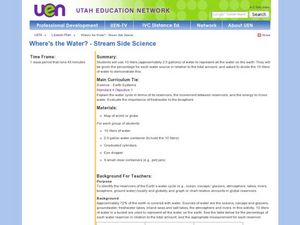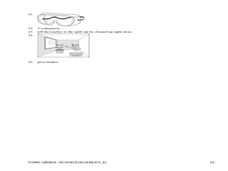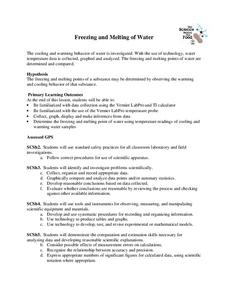Curated OER
The Science of a Historic Sinking
Incorporate science investigations to expand pupils' understanding of the Titanic.
Mascil Project
Molecular Gastronomy - Science in the Kitchen
Some say cooking is an art—and a science! Scholars scope out the savory subject of molecular gastronomy with a series of related activities. The teacher's guide contains printable worksheets and helpful tips for implementing the lesson...
Curated OER
A Device That Condenses Water
Fifth graders who are studying water vapor and the condensation process use this worksheet to help them understand the process of condensation. Most of the worksheet is simply a source of information, with a good descriptive paragraph...
Curated OER
Exploring the Water Cycle
The water cycle is one of earth's most easily observable processes, but demonstrating each step within classroom walls can be a challenge. Through a series of videos and quick demonstrations, cover each aspect of the hydrologic cycle in...
Curated OER
Understanding the Water Cycle
Investigate the water cycle and how water moves from the land to the air and back to the land. Create a terrarium and observe the water cycle at work. Define weather terms including evaporation, condensation, and precipitation.
Curated OER
Where's the Water? Stream Side Science
After a whole-class discussion of water reservoirs, ten liters of water are given to each lab group to represent Earth's total amount of water. They divide the water into smaller containers, each representing one of those reservoirs. The...
US Environmental Protection Agency
Aquifer in a Cup
Young scientists create their very own aquifers in this science lesson on ground water. After learning about how some people get their drinking water from underground wells, young learners use sand, modeling clay, and aquarium rocks to...
Curated OER
Water Cycle Reading and Writing
After listening to a story about the water cycle, learners create their own versions of this tale. This is a great way to have your class review the concepts of evaporation, condensation, precipitation, and runoff.
Curated OER
Water Cycle Reading and Writing
Here is a great way to get pupils to express a scientific concept in a fun way. After hearing the story of Walter the Water drop and learning facts about the water cycle, the class will write a creative expository piece describing what...
Baylor College
We Need Water
There's nothing quite like a glass of ice-cold, freshly squeezed lemonade. Lesson seven of this series explains how the water humans need to survive can come in many forms. Teach your class about how much water humans require every day...
Polar Trec
Where is the World's Water?
Scholars discover the amount of the Earth's water in various locations such as the ocean, ice, the atmosphere, etc. They then make a model of the how much water those percentages represent. Finally, analysis questions bring the concepts...
Curated OER
The Water Cycle
An inventive and interesting activity on the water cycle (and other cycles associated with it), is here for you. After doing a well-designed hands-on inquiry in class, learners also identify organisms and processes that are involved in...
Curated OER
Drinking Water and Water Purification
Sixth graders design experiments to compare the amount of bacteria in river water to the amount in purified tap water. They explore how water purification removes bacteria and pollution from the water. Students examine the steps of the...
Curated OER
Water Pressure Blaster
Third graders complete an experiment to introduce them to the concept of water pressure. In this water pressure lesson plan, 3rd graders create pressure in a water bottle and observe the force of water that is created.
Curated OER
Third Grade Science
In this science activity, 3rd graders answer multiple choice questions about measurement, plants, water, fossils, and more. Students complete 25 questions.
Curated OER
The Water Cycle (Evaporation, Condensation, Precipitation)
The 3 steps of the water cycle, evaporation, condensation, and precipitation, are the focus of this lesson. After a neat demonstration of rain using hot water, a pie tin, and ice cubes, young scientists observe and discuss the elements...
Curated OER
Water and Polymers
Young scholars conduct qualitative and quantitative investigations based on the interaction between water and various polymers. They determine the percent moisture contained in various plastics along with a qualitative procedure to...
Project WET Foundation
We All Use Water
How many ways is water used? Indirect and direct water use are the two main ways humans use water, but the usage comes in many forms. Animals, agriculture, industries, transportation, and many more rely on water for different uses....
University of Georgia
Freezing and Melting of Water
Examine the behavior of energy as water freezes and melts. An engaging activity provides a hands-on experience to learners. Collaborative groups collect data and analyze the graphs of the temperature of water as it freezes and then...
Curated OER
The Properties of Water: "Dead Or Alive"
Students study the water cycle and create a booklet entitled: "Discover the Wonder of Water" They observe and record data regarding evaporation, condensation, and precipitation and how water moves from a solid to a liquid to a gas. They...
Florida Department of Environmental Protection
Water, Water Everywhere
Water is one of the most precious resources on the earth. Explore water conservation, the importance of natural resources, and how water is used throughout the globe. Two complete activities along with discussion questions are used to...
Kenan Fellows
Making Connections with Water Quality
What's in your water? And, why is water quality so important? Enhance your class's level of water appreciation through a lesson that demonstrates the necessity of water quality. Environmental enthusiasts explore the EPA's Clean Water...
American Museum of Natural History
What's the Big Deal About Water?
It may seem simple, but water is one of the most unique substances on Earth. An interactive online lesson describes its properties and importance in so many different situations. Learners interact with the lesson to learn the role water...
American Museum of Natural History
What Do You Know About Virtual Water?
Did you know you can conserve water by drinking tea instead of coffee? Learn about other products that use larger amounts of virtual water in an online lesson. Pupils complete a series of questions to test their understanding of the...
Other popular searches
- Water +Science
- Water Science
- Water Science Project Ideas
- Science Water Use
- Science Everyday Water Use
- Water Science Glaciers
- Science Water Cycle
- Earth Science Inquiry Water
- Water Science Properties
- Water +Science Glaciers
- Water Science Phosphorous
- Science Water Clarity

























